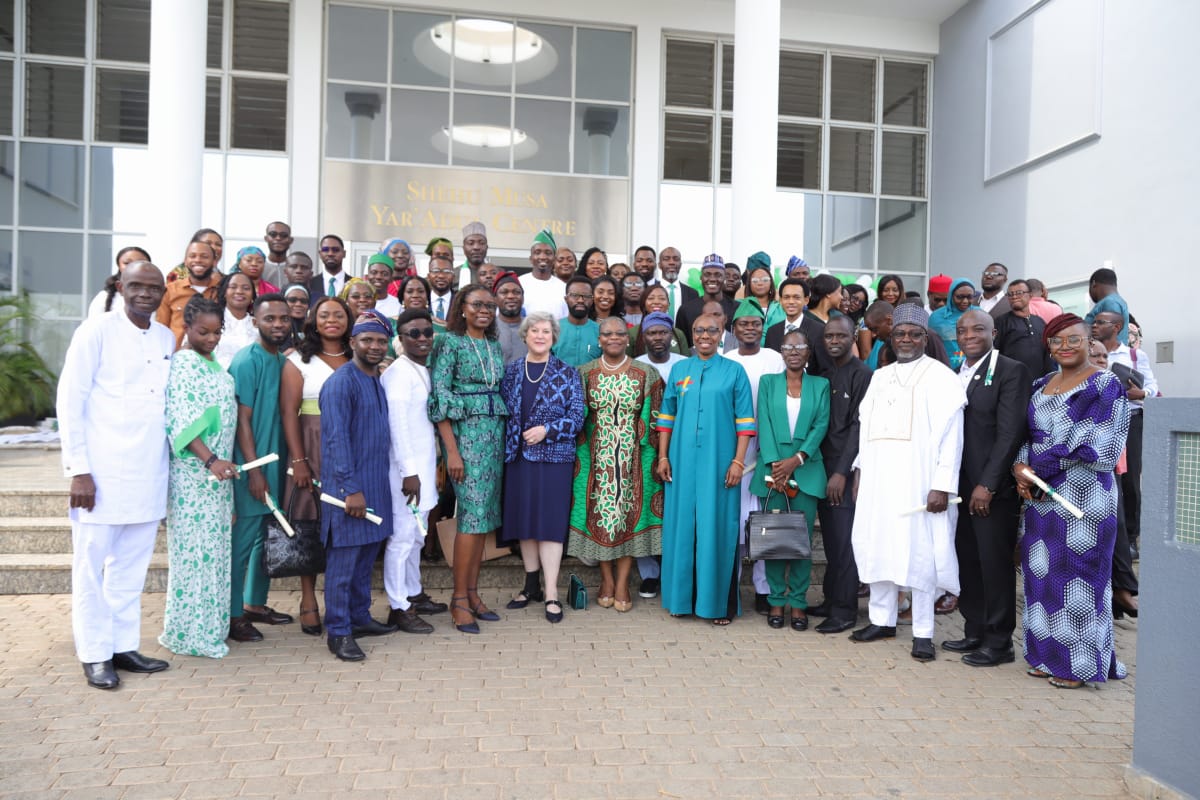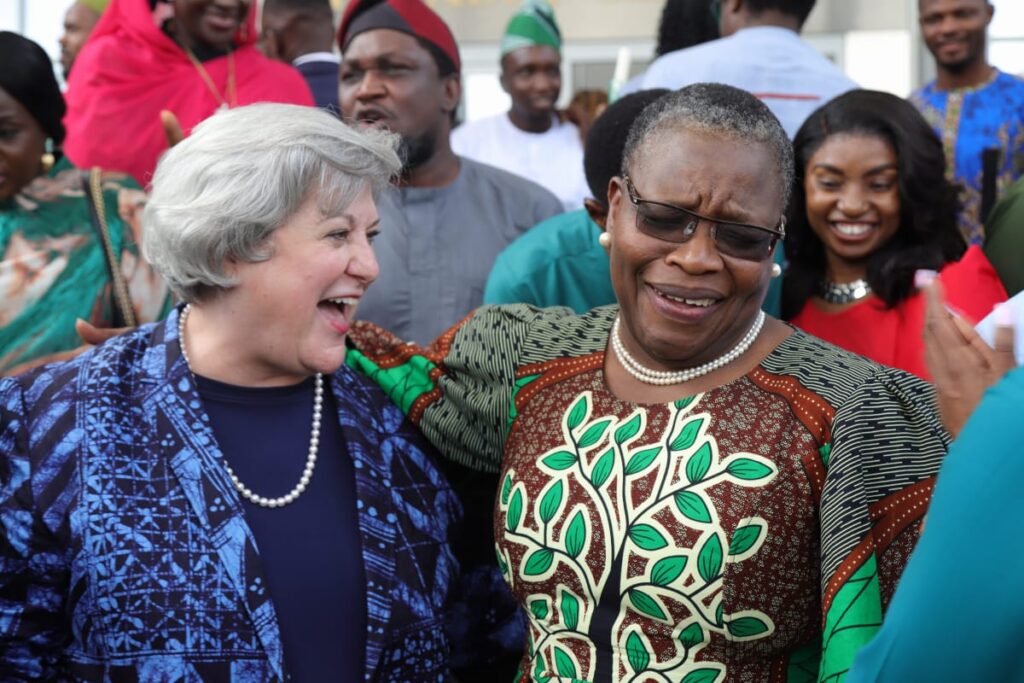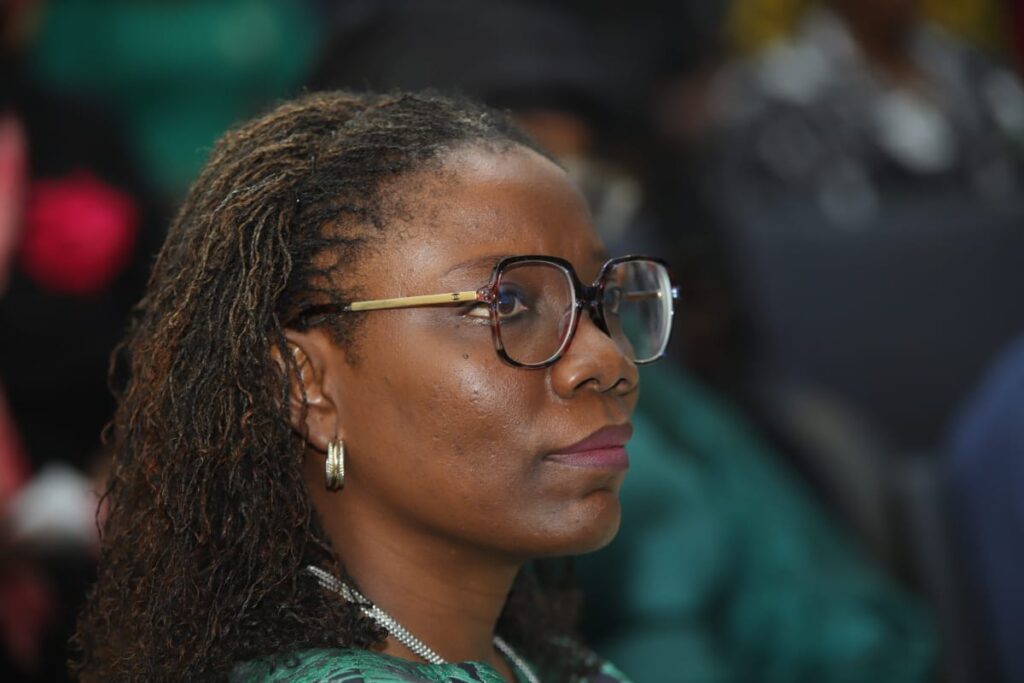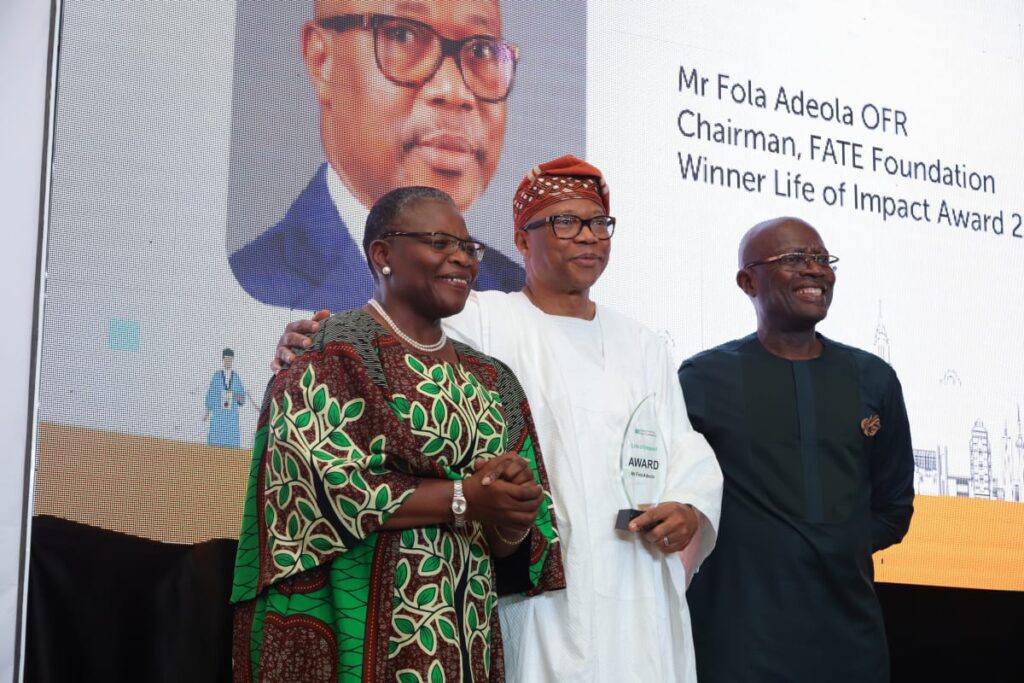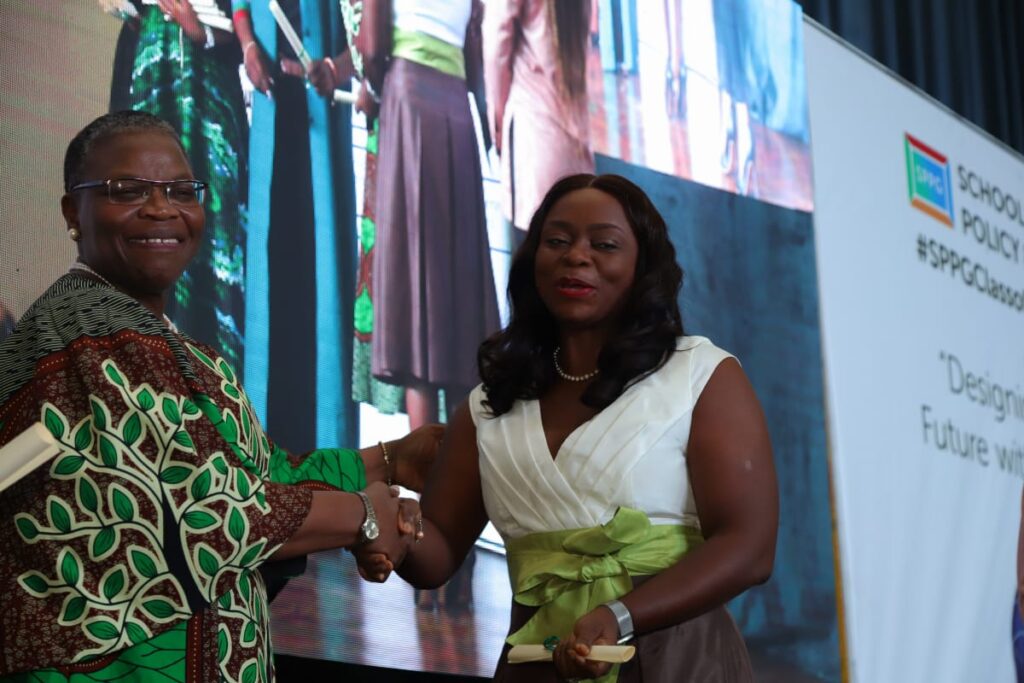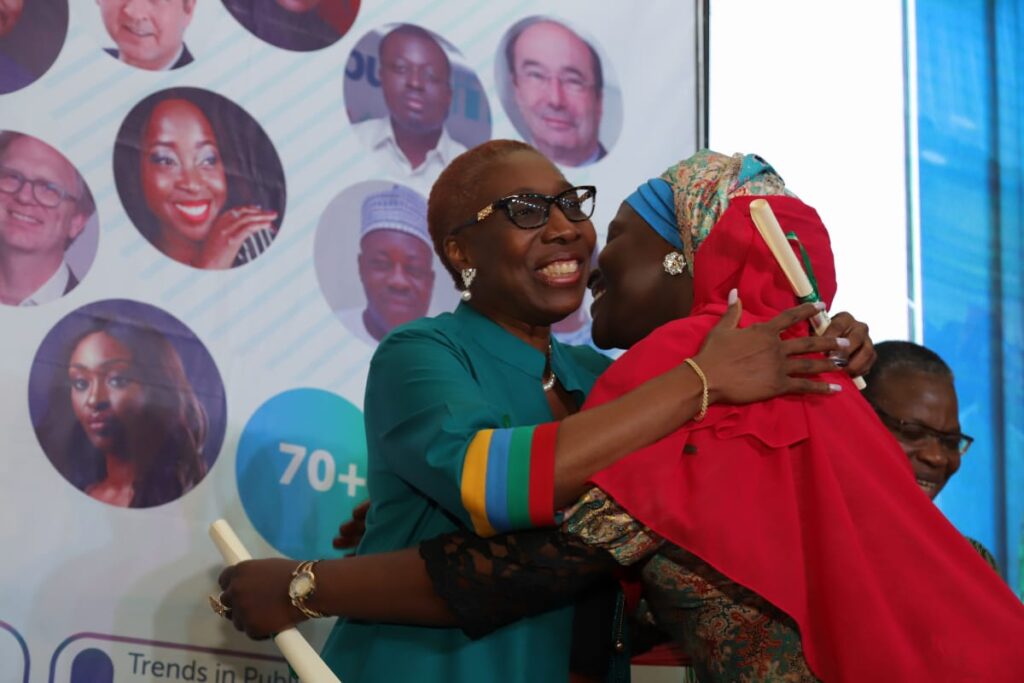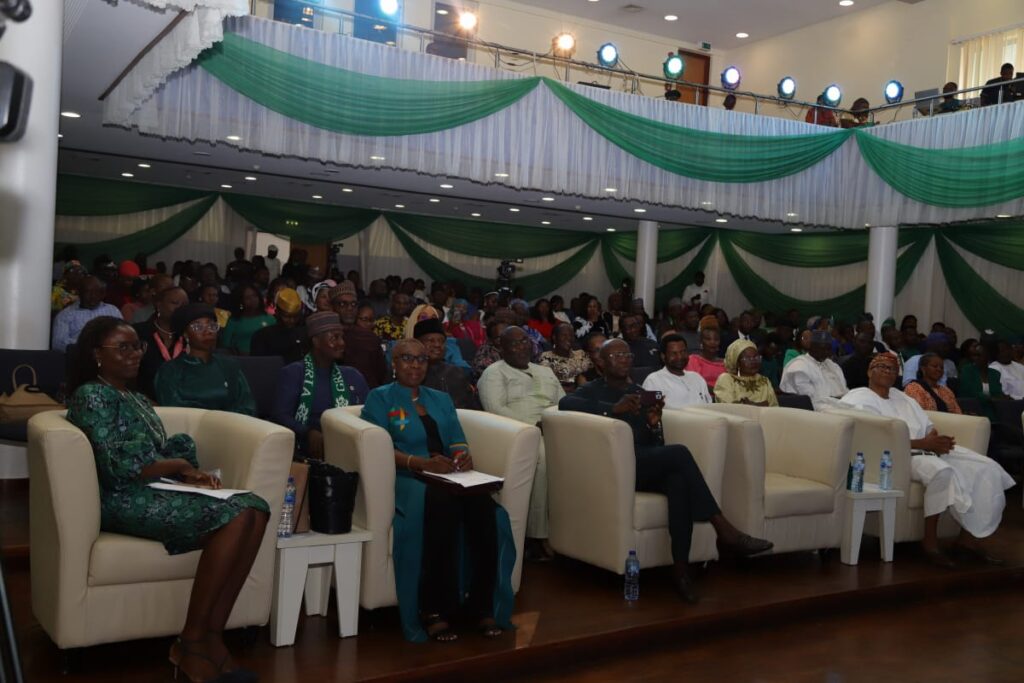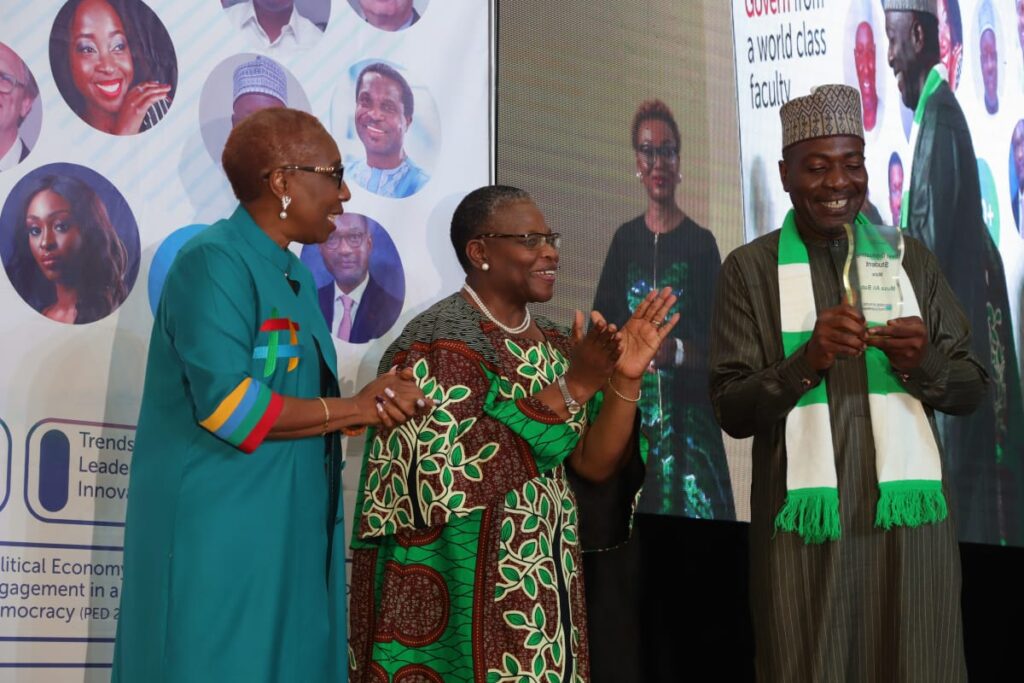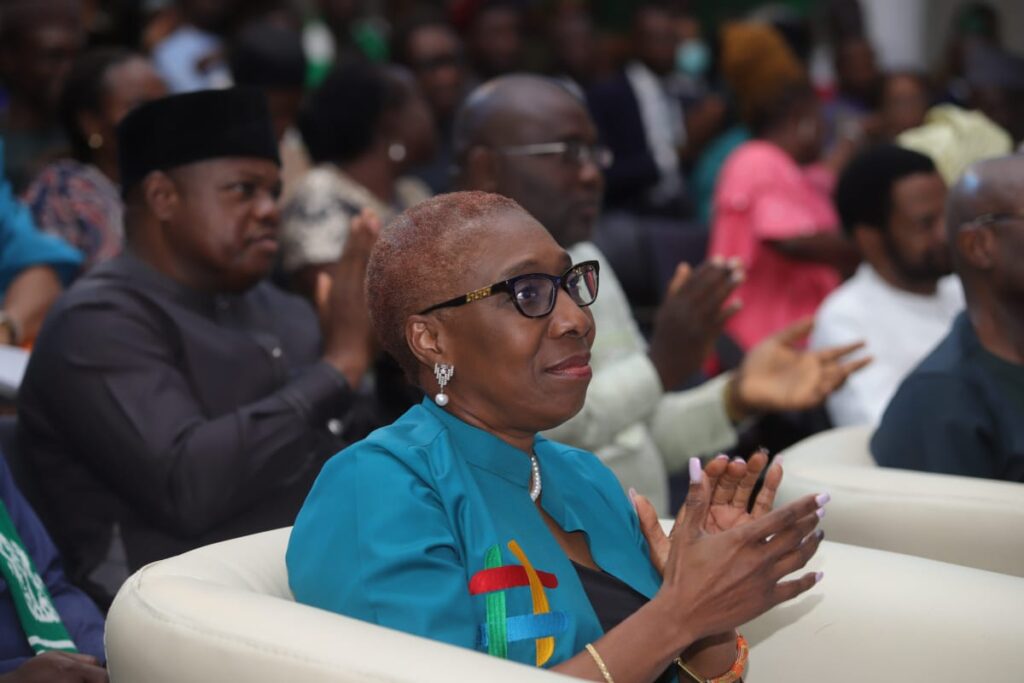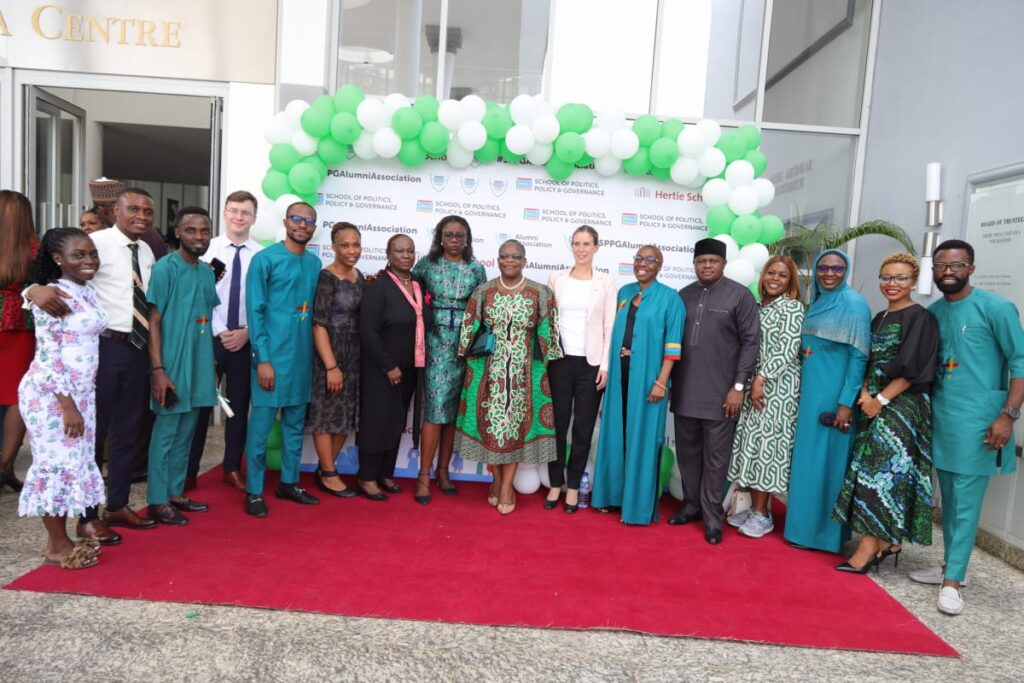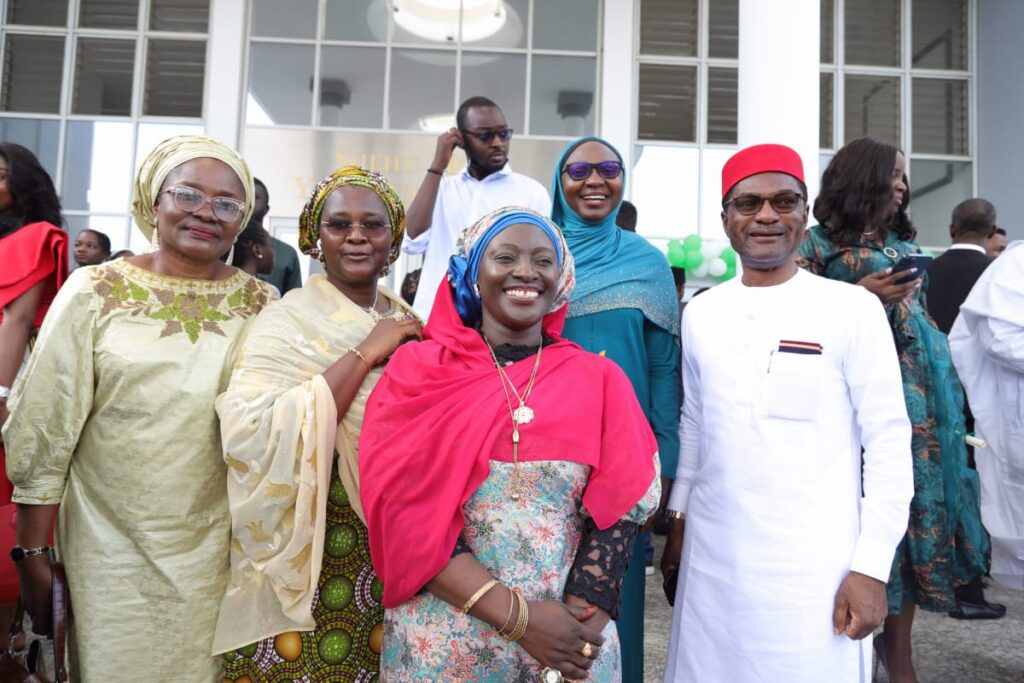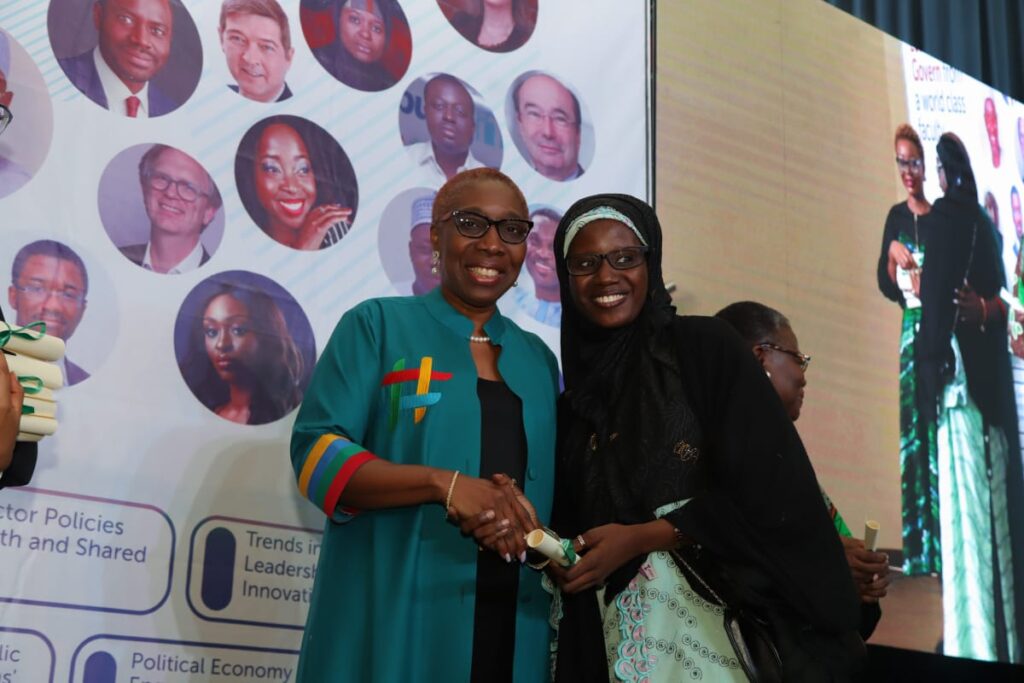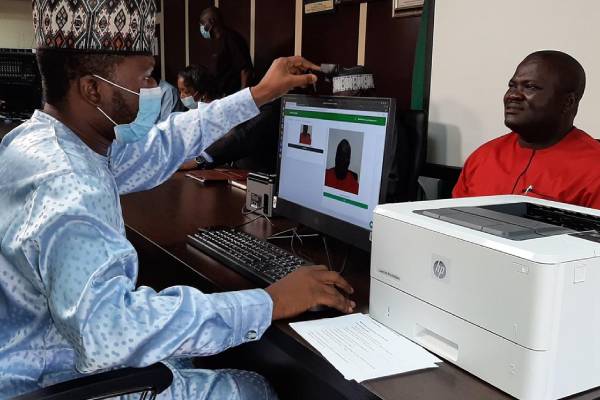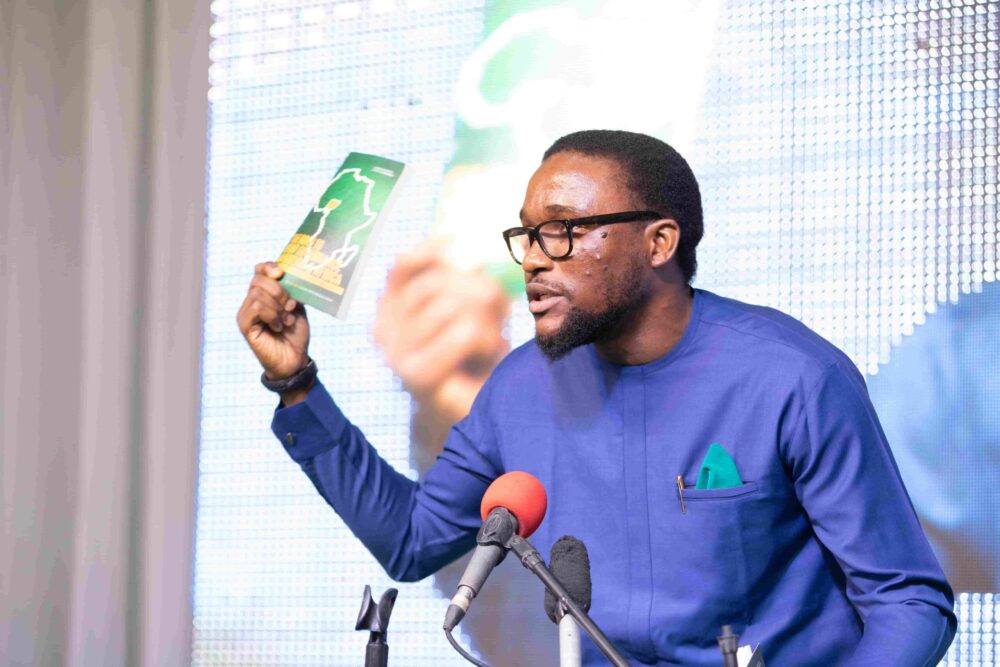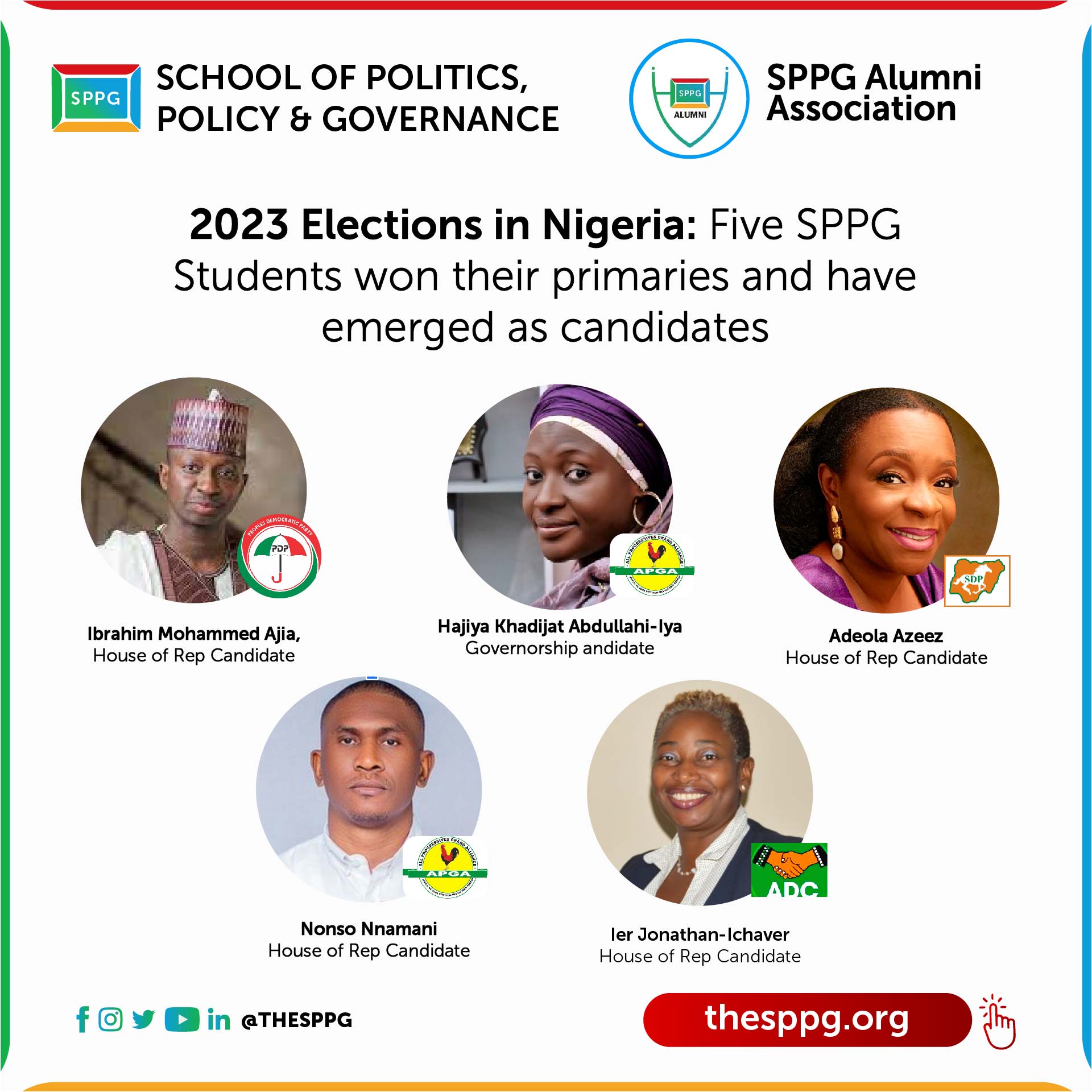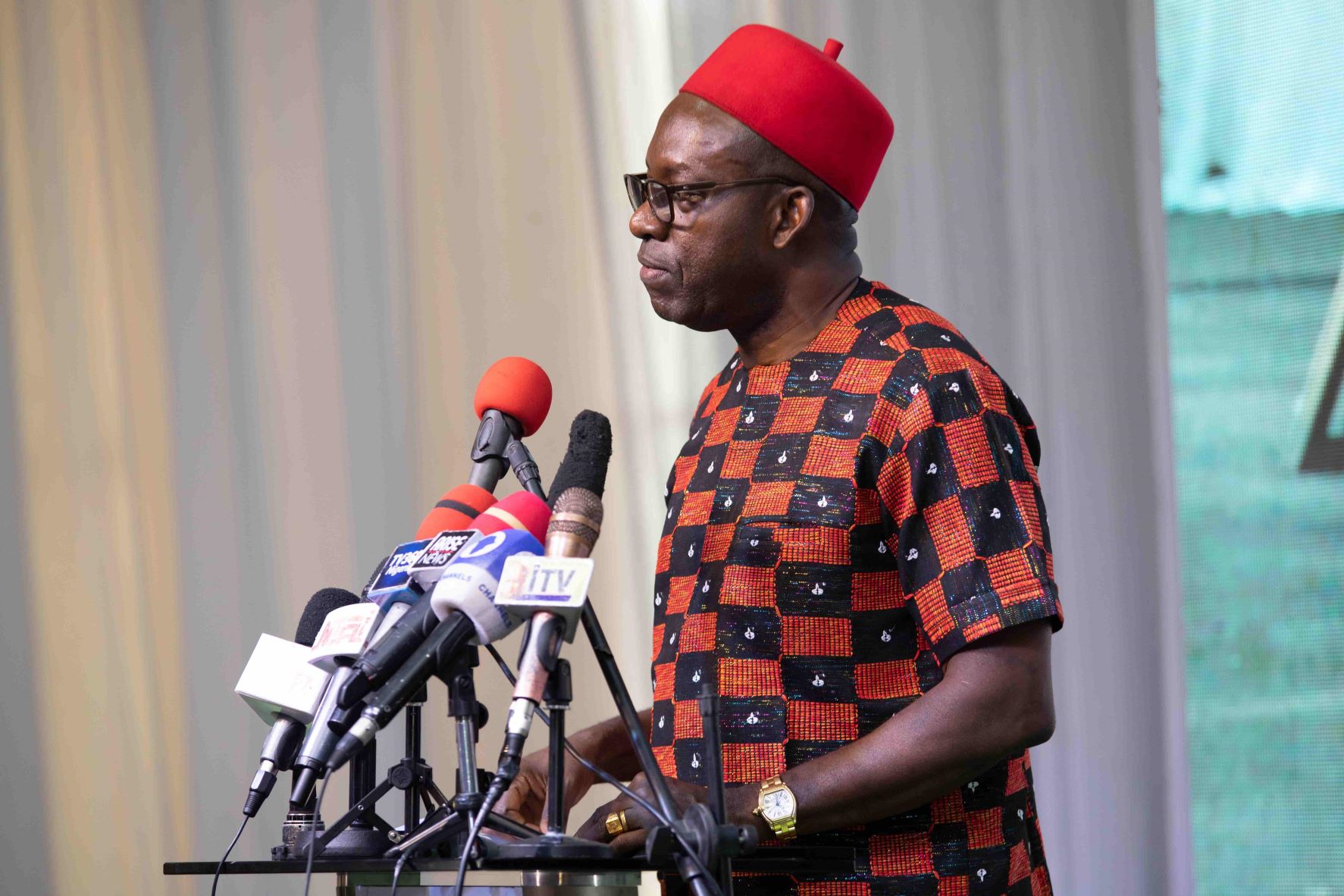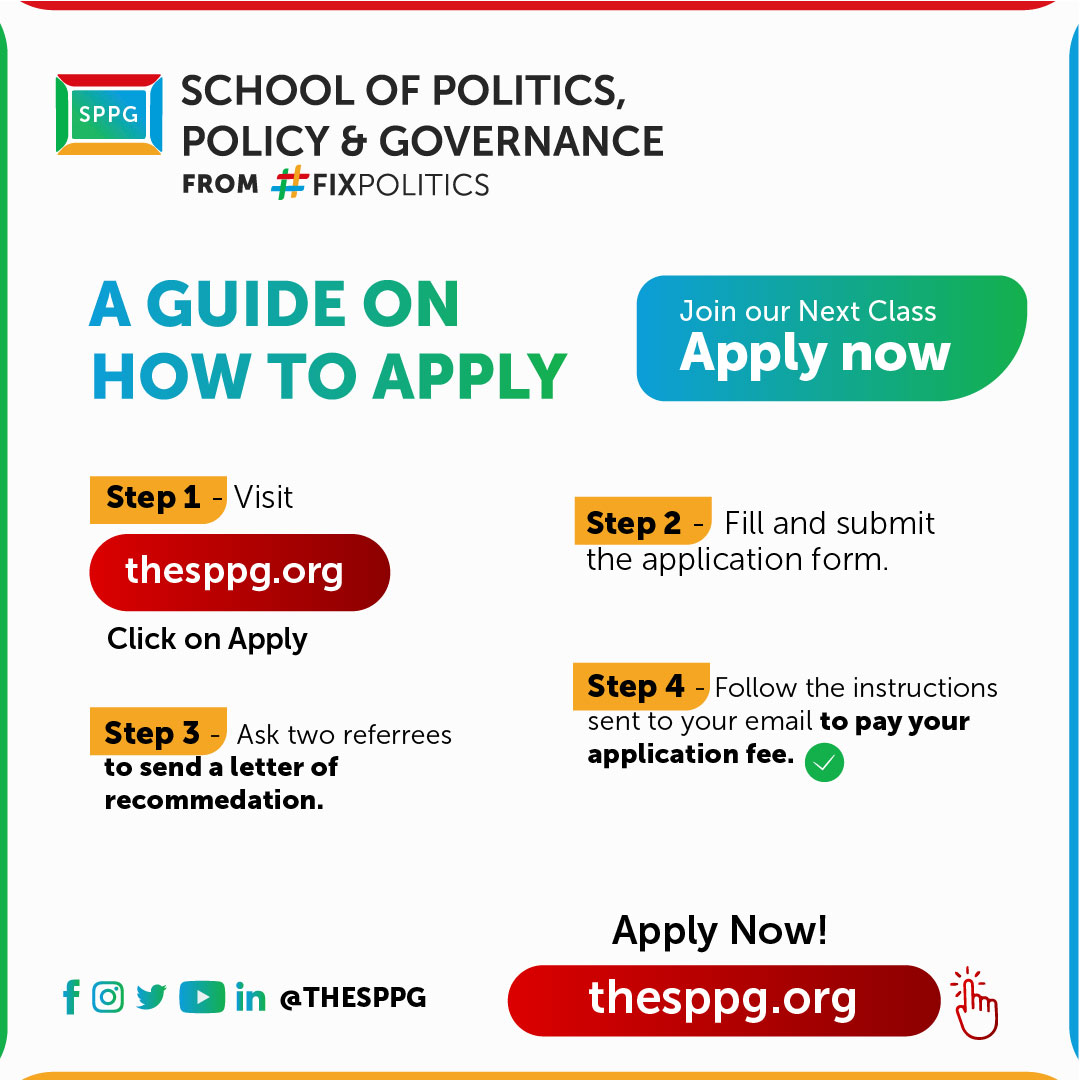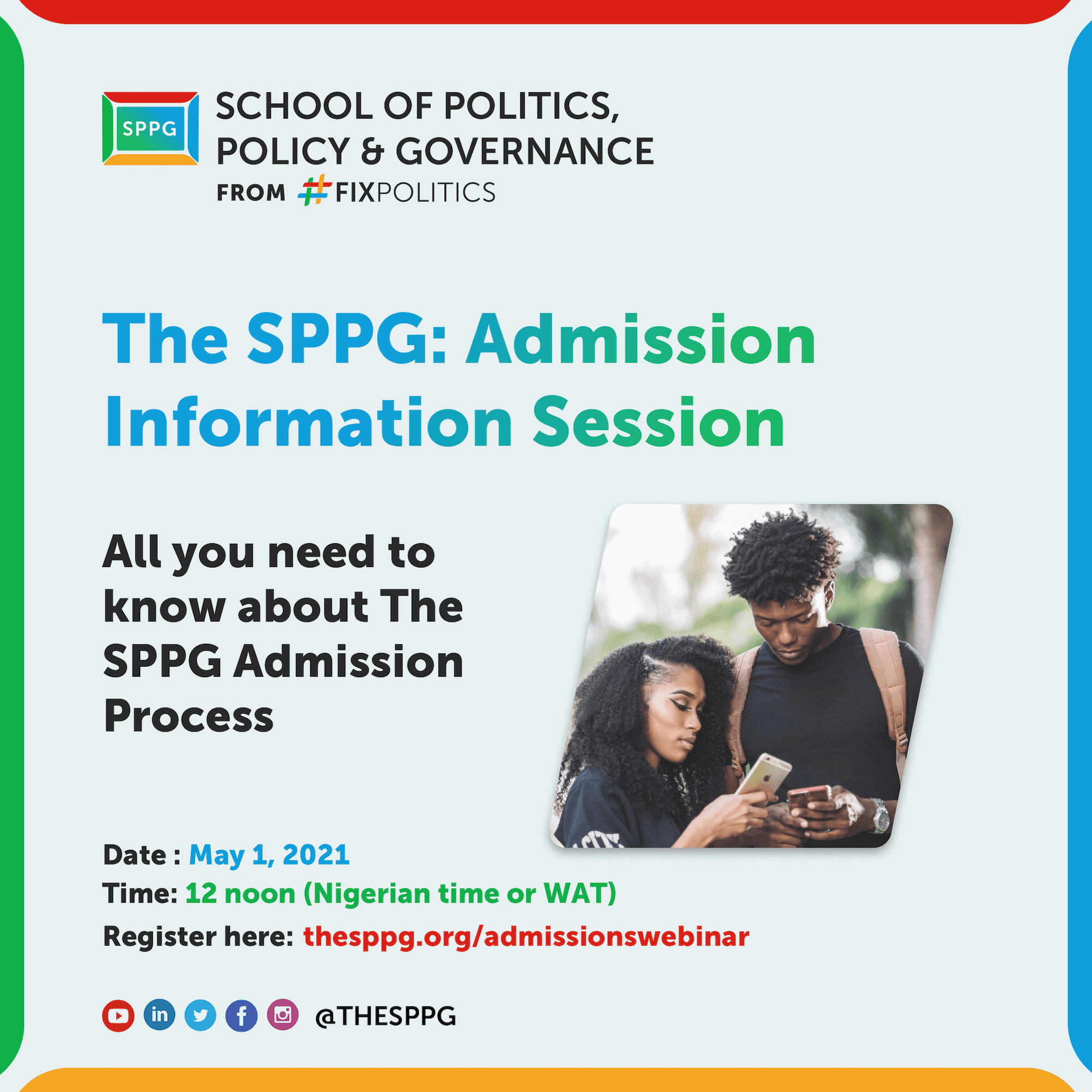SPPG Graduates 133 new disruptive thinking leaders in 2022
In a bid to produce the next generation leaders with disruptive thinking, School of Politics, Policy & Governance, (SPPG) over the weekend held a graduation ceremony for 133 students for the 2022 academic year in Abuja Nigeria.
At the 2022 graduation ceremony of the School of Politics, Policy, and Governance with the theme: “Designing Our Global Future with Africa in Mind” held at the Shehu Musa Yar’dua Centre, Abuja, were Chairman, FATE Foundation, Fola Adeola, former Minister of Information & Culture, Frank Nweke Jr., former Minister of Education/founder SPPG, Oby Ezekwesili, US Ambassador to Nigeria among others.
Speaking at the ceremony, Chief Executive Officer of SPPG, Alero Ayida-Otobo, said the institution was designed to transform the quality of political and public leadership in Nigeria and the rest of Africa.
She disclosed that the 2022 graduating class comprised 133 students who underwent 10 intensive months of training and learning.
“For the class of 2022, about 133 students are graduating. The pioneer class was 160, and they have gone through 10 intensive months of training and learning. They studied 140 topics and seven thematic areas. Research shows that there were certain gaps in the knowledge base of many public leaders. So, this is our own contribution to building the knowledge base of future leaders, and we are very pleased that we have 133 graduates.
“A lot of them are already doing great work. They are already community organisers serving at the community level and recruiting individuals that have the potential to be part of our community. Among them, we have at least 5 that scale through the primaries conducted by parties.
“Our 10 months course stretches and strengthens one’s leadership capacity, and our students who were aspirants demonstrate that what we are teaching is not just possible, but we have people running the race already”.
Meanwhile, former Minister of Education, Dr. Obiageli Ezekwesili, has linked the root cause of Nigeria’s leadership problem to distorted political culture where leaders place personal interests above the public good.
According to her, there must be a change of mindset by leaders to tackle the growing economy and security challenges in the country.
Ezekwesili, who is also the founder of SPPG, observed that character, competence and capacity was the missing link in producing good leaders in the African continent.
She, therefore, stressed the need for disruptive thinking in the nation’s political space.
She said: ” We found that not just in Nigeria, but across Africa, there is a distorted political culture.
It’s the political culture where those in public leadership subordinate the public good. That is the common good for their personal and narrow interests. And so, what it means is that the common good and public good is not served by people who should be serving. So, to correct that, you have to customize a new leadership mindset.
“So, the training that we gave at the School of Politics, policy and governance has the content to reset the mindset of those who wish to lead in public service.
“They lead by serving, they place character at the foundation of the knowledge that we give to them by improving on their competency and the capacity for them to be able to articulate sound policies, be able to design institutions that enable society to advance and to have the capacity to make the right choices of investment in the goods and services that countries need in order to grow”.
The ex-Vice President for the World Bank’s Africa Region, said ahead of the 2023 elections, such distorted political culture could be corrected with sufficient information on the part of the Nigerians.
According to Ezekwesili, there is a need to educate and sensitize the citizens on the consequences of making bad decisions during elections.
“I think that one of the things that our research shows is the important role of citizens, which is why a critical pillar in the research of fixed politics is the pillar on empowering and enlightening the electorate so that they would have enough influence sufficient enough to influence political outcomes. So, the role of the citizens in democracy is part of what the SPPG promotes and again, we must have the office of the citizen, the community organizing approach, and all the other things that lead towards an empowered citizen that can push back and demand accountability as well as the emergence of the right kind of leadership for our public space”, She added.
Former US Secretary of States, Hillary Clinton, in a short video message, stressed the need for Nigerians to vote during elections, noting that participating in electioneering activities would strengthen the nation’s democracy.
The best graduating students are Joyce Daniels- female and Musa Ali Baba- male.
SPPG Group 7 launch the Perfect Seven Project to resolve voter apathy and increase citizen participation in the electoral process
SPPG Pioneer Class 2021 Group 7, for their SPPG Capstone project, launches the perfect seven projects to resolve voter apathy and increase citizen participation in the electoral process.
Since the return to electoral Democracy in 1999, elections in Nigeria have been characterised by voters’ apathy. Only a small percentage of eligible people vote. For instance, in 2019, the Independent National Electoral Commission’s record revealed 82.3 million registered voters nationwide; during the presidential election day, only 28.6 million (a mere 35%) voted. The elected President received his mandate for a second term on the strength of votes cast by a paltry 18.5% (15,191,847) votes.
Chechet Benjamin Andrew, Ojoshide Isabel Ugbaje, Okon Glory, Timkat Nanmak Peter, Collins Okeke, Aderemi Yusuf Adewale, Dele David Ogunsoto, Omotola Adeyoju Ilesanmi, Mary Uche Emmanuel-Okorie, Chiezugolum Ijeoma Odilinye, Gold Soni Ugochi and Ode Debra Achugwu, all members of SPPG Pioneer Class Group 7 for their capstone project, launched the perfect 7 Project to increase citizen participation in the electoral process.
This project is designed to change the depressing narrative of voter apathy and galvanise the Nigerian electorates to participate actively in large numbers in the electoral process. Not just to vote but also to hold elected candidates accountable for their stewardship.
According to Group 7, “The primary target group are people aged 18+. They are people within the eligible voters range, directly influencing the outcome of an election. If they do not make informed decisions or participate in the electoral process and governance, we can achieve little or no change. According to Worldometer (October 2021), Nigeria's population of about 211 million people, about 50% are, aged 18 and above. According to INEC, there were about 84 million registered users. However, elections do not reflect these numbers, as less than 20% voted in 2019. this figure has further fallen, as we’ve observed in state and local elections. Nigeria’s population is growing at a rate of 3.2% per annum. It is estimated that the population of Nigeria will be 402 million by 2050, of which the youths make up 60%. Therefore, we are also targeting teenagers who would be turning 18 in the next two election cycles.”
To achieve the goal of the project, the Group produced video skits in different Nigerian languages designed to create a mind reorientation and move Nigerian citizens from political apathy to participation.

Video 1 -> Politics is Life, Get your PVC -> https://youtu.be/9xpL67RL3zk

Video 2 -> Politics is Life, Get your PVC in Yoruba Language version 1 https://youtu.be/6Tm1AvflsFU

Video 3 -> Politics is Life, your PVC in Yoruba Language version Get 2 https://youtu.be/OCM1LdFG2nI
The Group distributed the productions across different media platforms.
The next phase of the project is to track the number of citizens who obtained their Personal Voter Card (PVC) and voted in an election as a result of our messages and to move Nigerians to imbibe, own and act on the Group's slogans: “Politics Is Life”, “Oro Oselu Se Koko”, “Politics Na Life.”
The Group hopes this becomes a life-long project that will go beyond group 7 of SPPG Pioneer Class. According to group 7, the issue of voter apathy and citizen participation will be solved through a marathon, not a sprint. The goal is to take measured and concrete steps that lead us to our goal, and we would evaluate the impact of each step and readjust our strategy.
They have plans to engage like-minded members from subsequent cohorts of the SPPG. These fresh, vibrant members, like fresh logs of wood, will spike the fire and keep it burning into eternity.
The Road to Good Governance in Nigeria & Africa: A Students’ Memoir of the SPPG Pioneer Cohort
SPPG Pioneer Class Group 12, Naija Pillars of Equity, for their SPPG capstone project, published a book: “The Road to Good Governance in Nigeria and Africa” A Students’ Memoir of the SPPG Pioneer Cohort.
The SPPG was formed amidst rightful discontent in the repeated cycles of bad governance seen across the African continent, particularly in Nigeria. The school enrolled its pioneer cohort of students on the 1st of March 2021 and began a mission to #FixPolitics in Nigeria and Africa.
For eight months, the SPPG Pioneer Cohort went through an extraordinary journey of understanding what it takes to fix politics. Through varied lectures, assignments, and group activities, students have been transformed by experiences that are no less than remarkable.
Patience Agbamu, Olaibi Noah Adebayo, Tauheed, Halimah Nene, Uchechukwu Dorothy Anagboso, Samuel Adebayo Adekeye, Ayobami Akinyode Olunloyo, Osanyin Taiwo Oreoluwa
Oluyinka Abiodun Oyeniji, Ikenna Ogbudimkpa, Ebi Juliet Ovie-Binitie, Kenneth Eneojo Uttih
Oyindamola Adenike Olugbile, Victor Uche Obioma, and Charles Ikenna O'Tudor, all members of SPPG Pioneer Class Group 12, Naija Pillars of Equity, agreed that for their SPPG capstone project, they would compile the individual “stories of fellow students and weave it together as a coherent amalgamation of students’ experiences, directly from the frontline of the SPPG journey, are the basis of their project.
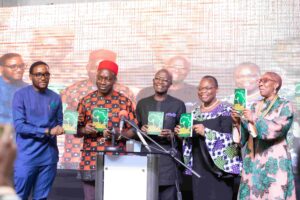
According to Group 12, “We believe that capturing this journey is necessary for a nation and a continent that need visibility of a new and positive future.” To this end, they published a book that captured various unique perspectives from members of the pioneer cohort of the SPPG.
The book was ideated through the lens of the School’s mission to educate present and future leaders dedicated to the good of the nation and ready to serve as stewards of the wellbeing of all Nigerians and its vision for a Nigeria with competent and responsible public Leadership firmly based on ethical principles and dedicated to serving the common good for the benefit of all.
The book captures how students' lives and thought patterns have significantly changed since joining the School of Politics, Policy and Governance. It is an interlinked compilation of individual SPPG experiences that challenge, excite, and encourage a new class of entrants into the school, but more aptly and ultimately into the political arena.
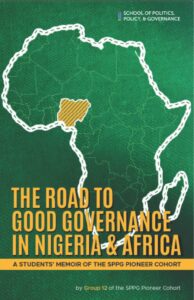
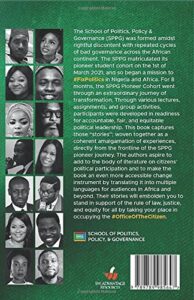
The book captures the values of accountability, respect and tolerance, stewardship and responsibility, social justice and inclusiveness, and ethical leadership (as a moral compass).
The book has been published on Amazon by members of Group12, while financial proceeds from its sales will be given back to the SPPG, with a percentage going to a charity of the school’s choosing.
The book was launched at the SPPG Pioneer Class graduation ceremony.
There are plans in the future to translate the book into French for audiences in Francophone Africa and promote the book within Nigeria and more widely across Africa and the diaspora.
According to the group, the lessons from the SPPG courses were instrumental in putting the chapters of this book together. Those who contributed to the book’s contents made references to several lectures and faculty members.
Obinna Gabriel’s grassroots advocacy helped fix a dilapidated road in Ayegbami community in Kwara State
Obinna Gabriel, SPPG Pioneer Class 2021, grassroots advocacy, helped fix a dilapidated road in Ayegbami community in Kwara State. He also took up another project designed to keep Ayegbami clean, which he named #CleanUpAyegbami.
While studying at the School of Politics Policy and Governance, Gabriel Obinna was posted to his primary assignment (PPA) place — Iman Hamzat Model College in Ayegbami — in June 2021. After getting to the community, he observed that the major road was dilapidated. As a development-oriented person, he met with some residents to determine whether the road was a top priority to them. During his meetings with residents, including their leaders, he was let in on the effects of the bad road; two children were said to have died in a flood and economic activities crumbled due to inaccessibility to seven neighbouring communities.
Leveraging his education at the SPPG, Gabriel conducted a needs assessment; he knew that this particular problem existed in Ayegbami, but he needed to be very sure; he went around the community and met with people to understand the magnitude of the problem. He met with people who stay at home, people who sell things in shops, people in his PPA and community leaders. After meeting with the residents, they assured him of their support in proffering solutions to the problem. The community leaders also gave him a letter detailing the challenges faced as a result of the road.
In July 2021, Gabriel drafted a project proposal, including the estimated budget.
Gabriel sent letters to several non-governmental organisations and business enterprises to get support for the project. He equally wrote to media organisations to create awareness for the plight of residents of Ayegbami.
His initial plan was to crowdfund, but he changed gears after realising that raising the estimated budget for the road project would be difficult.


In August 2021, a member of the community advised him to reach out to Abdulganiyu Cook Olododo, the federal lawmaker representing the Ilorin East/South constituency. After contacting the lawmaker, Gabriel was invited to visit the constituency office to discuss the project.
Courtesy of Gabriel’s intervention and advocacy, the construction of the road was added to the list of projects for the constituency in 2021.
In September 2021, construction works started on the road, which brought excitement to the residents as their dream of having a good and accessible road was becoming a reality.
In January 2022, the construction was completed — and it was a dream come true for residents of Ayegbami as their biggest challenge was finally in the rearview.
Speaking about his motivation, Gabriel Obinna said he is always looking for problems to solve wherever he finds himself.


He believes he can always mobilise people to proffer solutions to daunting societal challenges. For Gabriel, the slogan is — to seek ways to solve problems instead of complaining. Gabriel did not stop at the advocacy intervention for road construction. He took up another project designed to keep Ayegbami clean, which he named #CleanUpAyegbami.
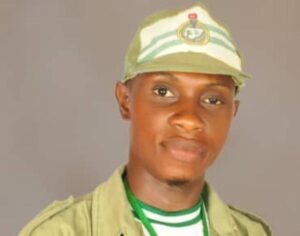
Gabriel designed the project after observing that Ayegbami was in a “serious environmental mess” as all open spaces were used as dumpsites.
For the project, he sensitised residents of the Kwara community on the importance of cleanliness and waste evacuation.
Although his work in Ayegbami thrust him into the spotlight, Gabriel’s knack for development advocacy did not start there. As a departmental president in UNIBEN, he established the first library in the institution’s department of mass communication and mobilised students to donate books to set up the library.
According to Gabriel, “I’m not the type who would rather complain than look for solutions,”.
2023 Elections in Nigeria: Five SPPG Students won their primaries and have emerged as candidates
SPPG Students Ibrahim Mohammed Ajia (PDP), Khadijah Abdullahi Iya (APGA), Ier Jonathan (ADC), Nonso Nnamani (APGA) and Adeola Azeez(SDP) successfully won their primaries. They emerged as candidates for their respective political parties in Nigeria.
The SPPG is designed to attract, develop and produce a new generation of political leaders who will listen to and serve the new class of citizens that know their rights, as well as produce 21st Century politicians who will be known for their values-driven character, unquestionable competence and undeniable capacity. To achieve its mandate, the School currently runs a ten-month programme for a Certificate in Public Leadership and Policy (CPLP); Since its inception in 2021, the School has trained and graduated 160 Students as part of its Pioneer Class and is training 154 Students in the Class of 2022.
Beyond the lessons in the classroom, of paramount importance to the School is the need for its students to run for office. The SPPG is non-partisan in its modus operandi; the SPPG has students from different political parties. Students can choose any political party or platform to run for office. To support its Students running for office, a roundtable session for political aspirants led by Dr Obiageli "Oby" Ezekwesili, Founder of the School and Alero Ayida-Otobo, CEO of SPPG, was organised to provide support for SPPG Students running for political office.
Leveraging their training at the SPPG, in the 2022 Party primaries, 55 students from the SPPG Pioneer Class and the SPPG Class of 2022 contested in their respective political parties to become candidates. Five students emerged as winners: Ibrahim Mohammed Ajia is the House of Representative candidate Asa/Ilorin West Federal Constituency for the PDP, Khadijah Abdullahi Iya is the Governorship candidate Niger State for APGA, Nonso Nnamani is the Federal House of Representatives, Enugu North and South Federal Constituency for APGA, Ier Jonathan is the Federal House of Representative Kwande/Ushongo candidate for the ADC, Adeola Azeez is the House of Representative candidate Ijebu Central for the SDP.
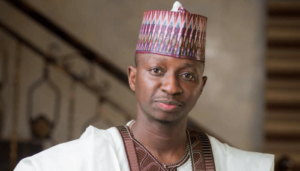
Ibrahim Mohammed Ajia, SPPG Class of 2022, PDP
Ibrahim Mohammed Ajia, an SPPG Class of 2022 Student and House of representative candidate of the Peoples Democratic Party (PDP) Asa/Ilorin West Federal Constituency, has pledged to attract development to his constituency and create opportunities for job employment if elected to serve. According to Ibrahim, "I have acquired that knowledge with modesty and built solid relationships with critical individuals and institutions in Nigeria and beyond. If I am entrusted to represent our Federal Constituency in the House of Representatives, I will be an active, relevant, and performing representative. I will be part of those who will make things happen in the House of Representatives. Our voice will be heard. Our needs will receive attention, our people will get what is due to us, and many of our youth will be gainfully employed."
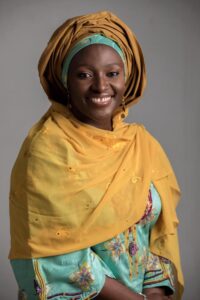
Hajiya Khadijat Abdullahi-Iya SPPG Class of 2022, APGA
Hajiya Khadijat Abdullahi-Iya an SPPG Class of 2022 Student, emerged winner at the governorship primary of the All Progressives Grand Alliance (APGA) in Niger State for the 2023 general election after defeating a male contender, Alhaji Mohammed Usman, with 121 votes against 20. Abdullahi-Iya brazed the odds to change the narrative of the male-dominated political terrain by contesting and clinching the ticket to fly the flag of APGA. According to Abdullahi-Iya, "I was able to leverage my training at the SPPG, the goodwill and relationship my family has built over the years, my social enterprise and existing party structure to win my primaries".

Nonso Nnamani SPPG Class of 2021, APGA
Nonso Nnamani is contesting for a seat at the Federal House of Representatives, Enugu North and South Federal Constituency in the upcoming 2023 general election on the platform of All Progressive Grand Alliance (APGA), his key agenda above power and political interest is to put the needs of the people first and to ensure that policies and programs accurately reflect the needs of his community. According to Nonso Nnamani “Having observed the Enugu North and South political space over the years, I firmly believe that there is need to renew the political class. Leadership is key! It is time to bring in new young leaders with capacity and competence to foster growth and development in our community. My purpose and agenda is clear - PUTTING YOU FIRST.”
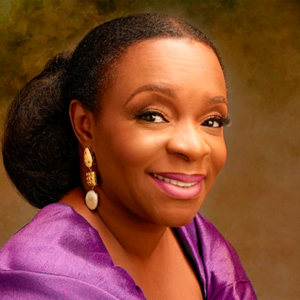
Adeola Azeez, SPPG Pioneer Class Alumni, SDP
Adeola Azeez, the daughter of elder statesman Pa Ayo Adebanjo, an SPPG Pioneer Class Alumna who is running for the House of Representative Ijebu Central under the Social Democratic Party (SDP) Is running to ensure regular electricity supply, creation of jobs, agricultural development and education, among others, in Ijebu Central Federal Constituency. According to Adeola Azeez, "I am not satisfied with the number of women in politics. We don't have enough women in government" She frowned at the rejection of the five gender-based bills by members of the House of Representatives, saying that such action was aimed at denying more women the opportunity to participate in politics. She believes the country cannot move forward as expected until more women are allowed in the three tiers and arms of government.
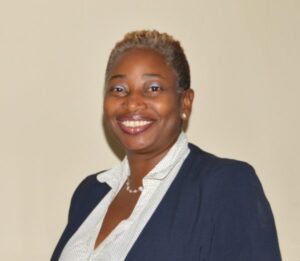
Ier Jonathan-Ichaver SPPG Pioneer Class Alumni, ADC
Ier Jonathan-Ichaver is an SPPG Pioneer Class Alumna, a social justice advocate, and co-founder of Sensor Empowerment Foundation, a disaster relief organisation supporting internally displaced persons (IDPs) and refugees. Ier Jonathan emerged as the Federal House of Representative Kwande/Ushongo candidate for the ADC.
Beyond the Primaries
The SPPG is focused on building ethical, competent leaders and producing at scale a new genre of public leadership that serves the people and delivers on governance. SPPG has set the goal of raising and preparing 10,000 disruptive thinking, values-based political leaders over the next ten years.
The Purpose and Price of Disruptive Change
The Purpose and Price of Disruptive Change
Chukwuma Charles Soludo, CFR
Being the First Graduation Day Keynote Speech at the SPPG Pioneer Class of 2021 (International Conference Centre, Abuja): January 29, 2022
0: PROTOCOL
Dear Friends, let me begin by appreciating one of Africa’s finest amazons and founder of the School of Politics, Policy and Governance (SPPG), my sister Dr. Mrs Obiageli Ezekwesili (Oby) for continuing to be a key change maker in Africa. Graduating the first class of the SPPG today is like planting many seeds in a wide field: some may end up as iroko trees, others as shrubs, but we hope that together, they will all bond into a visible and impactful forest. When I received Oby’s letter some five days ago, I concluded that given my punishing schedule at the moment, I would just come and make a few extempore remarks. But I decided last night to scribble a few talking points--- to avoid being misquoted. Therefore, if I appear incoherent, please forgive me.
The Graduation Theme is “Emergence of Unconventionals”. I understand that SPPG was founded to radically and deliberately transform the quality of political and public leadership in Nigeria and Africa, with a view to building a pipeline of value-based and disruptive thinking political class equipped with requisite knowledge and skills to solve complex problems of development in order to reposition Africa in the 21st Century. This is music to my ears and Africa is grateful to Oby.
In 1999, I co-authored a book entitled “Our Continent, Our Future: African Perspectives on Structural Adjustment”. In 2000, I was the long-term consultant in a pan African project that resulted in a book published by the World Bank entitled “Can Africa Claim the 21st Century?” In both books, we identified the centrality of disruptive leadership and a developmental state in Africa’s renaissance. A little over 20 years later, the SPPG has set out to walk the talk by working to deliberately orchestrate the emergence of leaders with knowledge and capabilities.
You can therefore understand why I am personally elated to be speaking at the first graduation ceremony of this cohort of emerging unconventional leaders. Congratulations to you all, and in a few seconds, I will be commiserating with you as well. You volunteered to be in this team, and my charge to you is to go out and make the difference: be the change you have offered to see. Africa is waiting for you. Africa is watching you. Do not let us down.
On leadership, Africa has had a chequered history. While some see only the dark spots, I actually see multi colours of the good, the bad and the ugly. While the bad and the ugly dominate, I always try to avoid what our other sister, Chimamanda Adichie called the “single story” of the African narrative. In some ways, part of our future is in our past. When I read about the plans, values, passion, and accomplishments of some of Africa’s liberation/independence leaders such as Julius Nyerere, Kwame Nkrumah, Nelson Mandela, Patrice Lumumba, Nnamdi Azikiwe, etc I have cause to smile as an African. Back home, I am inspired by the examples of Aminu Kano, M.I. Okpara, Obafemi Awolowo, Sir Ahmadu Bello, etc in our first republic. We can fill up hundreds of pages as eulogy to our gallant and patriotic past heroes and heroines, including those distinguished civil servants, captains of industry, journalists, civil society activists, musicians, etc who worked hard and some even paid the ultimate price to see Nigeria a better place. In our more recent history, especially since 1999, we have seen occasional glitters of hope here and there but despair deepens. Around the continent, there is a mixture of bright and gloomy stories. “Africa Rising” was not just a fluke. The Dark Continent remains potentially the land of opportunities and could indeed be the global economic driver of the 22nd century. But the time to lay the foundation is now. The second scramble for Africa is raging, with the Chinese on the loose. Africa indeed needs new orchestra teams and new songs. It needs to run at the speed of a thousand kilometres an hour to seize back its future and shape its narrative. The graduates of SPPG have onerous and daunting tasks ahead of them. You have my commiserations!
With some 140 multidisciplinary topics covered in the past eight months, what can anyone tell you again in terms of knowledge. You have it, and also know where to find more if needed. With the hoes and machetes, the next is to get into the farm and ensure higher productivity. That farm is the field of politics, policy and governance. I am sure you carefully studied the nature of that farm in Nigeria and Africa, and I wish you good luck as you try to navigate through it to leave the society better than you met it.
But let me suggest, for emphasis, that indeed Africa needs a new liberation movement. The first struggle was liberation from the colonial masters. The second will be liberation from rentier politics and politicians. For me, there is almost a sense of nostalgia, recalling the mission and accomplishments of our founding fathers, especially as we contemplate the world without oil in Nigeria. Much of the existing social order is founded on competition for, and distribution of, rents. Oil and the easy money that came with it destroyed the social fabric and the elite created new institutions and political structures to maximize their gains. As the noose tightened globally on other rentier/criminal enterprises such as drug trafficking or internet scamming, many of the barons flocked into politics as the next easy alternative.
Politics has become big business. Appointment or election into public office is seen largely as an opportunity to “eat” rather than a call to selfless service. There is an army of rich (big men) who have never worked or done any productive work in their life and believe that it is their right to expect something for nothing. The tiny less than one percent elite have a stranglehold on the public purse, sprinkling occasional crumbs to the citizens as ‘dividends of democracy’. The citizens themselves either out of helplessness or acquiescence join the party, expecting the politicians to dole out pittance out of public treasury as charity. The citizens actually clap for such phantom “charity”. Politicians who refuse to do so are deemed as “stingy” or “wicked”, and the circus goes on. With a rentier system, a culture of freebies emerged, and most people don’t expect to pay for anything, including taxes, electricity, water, petrol, etc. A classic feature of the political environment is that corruption has become part of the “culture”, with little incentive for honesty. Honesty is scorned as wickedness, foolishness or mere pretense, and those who dare to be different have a steep price to pay. So, who among you is ready to be honest and scorned by society?
Oil is on its way out, but dismantling the decades-old debilitating institutions and politics around it won’t be a tea party. Nigeria is now at a fiscal cliff with a crunching solvency challenge. Youth unemployment, insecurity, poverty, inflation, etc threaten the social fabric. Migrating to a post oil world of 4th Industrial revolution and sustainable prosperity will require massive disruptive transformations and restoration of a productive social contract.
Such disruptions will come at great costs, and could indeed be dangerous. It is not far to imagine what could befall serious disruptors. In Nigeria, we remember what happened to Murtala Muhammed, and the history books are replete with hundreds of examples of the inherent risks. At a personal level, undertaking the banking revolution in Nigeria came with 19 written threats to me and my family, including physical attacks. Disrupting the existing social order is dangerous. Beneficiaries of the current order are powerful enough to organize and viciously fight back to protect their privileges. On the contrary, the masses who are the ultimate beneficiaries are not organized enough to act as a bulwark against the special interests. As things stand currently, we are standing between the rock and the hard place. With the objective to retain power within the context of short electoral cycles, politicians are afraid to undertake the necessary disruptive changes to guarantee long term safety and prosperity for all. On the other hand, the existing trends are totally unsustainable and the system is living on borrowed times. Everyone is sleepwalking to the hard place, and praying that somehow a miracle will happen along the way.
So, who is ready to put his head on the line to lead such productive but dangerous disruptions? Are the SPPG graduates ready for the assignment? I assume that you can’t wait to get to work, to apply your knowledge for a new Nigeria. Am I right? You have my prayers! As I pray for your success, let me throw up a few random nuggets to chew on your way.
Dear friends, fixing politics requires talent and skills. But these won’t be enough. It won’t happen by lone wolves working in silos. It requires new developmental organizations – organizations/teams of believers, driven by defined ideology, purpose and character. Let’s be clear about one point: Nigeria does not lack well educated/skilled and widely travelled stock of human capital to drive her development. In the U.S alone, Nigeria ranks highest on education among ethnic minorities and as a percentage of its population, it has the most educated population of all ethnic groups. At home, we have over 100 universities churning out hundreds of graduates every year. All over the world, Nigerians excel as champions in their various fields. A key missing link is purpose driven cohesion and organization for transformation of the homeland. There are many disparate groups and organizations, including political parties which claim (at least on their statutes) to champion national development. Only a few, if any, can be identified by any soul in terms of a nationalist ideology, professed and practiced by its members. The liberation struggle for independent Africa was driven by a nationalist ideology to be anchored by a developmental state. There is a huge void today, and I am not sure how we can fix our politics without the requisite organizations for change.
So, my first charge to my new friends and graduates is to profess their purpose in the political farmland and actively participate to actualize it. If you have not yet done so, when you go home today, write down your purpose (what do you want to achieve) in the public arena and paste same beside your reading table or anywhere for everyday reference. Then join a political party, a civil society organization, or organize alternative better platforms of leverage. You may better disrupt from inside than outside. Organization is power. The key is to participate in the process or stop complaining. For Nigeria, most people focus on politics in Abuja and we have for too long tried in vain to fix Nigeria from the obtuse centre. It is time to try fixing it and its politics from below--- from the subnational units. If you have something to offer, go and run for office. Win or lose, your participation will add something to the process. Then persevere, endure, and remain focused on delivering your purpose.
For starters, let me suggest that the Alumni of SPPG should form themselves into a New Nigeria Network for change. As SPPG expands, an African network would emerge. Over the next decade, I can see a network of thousands of Africans who share a common template for redeeming our heritage. A Pan African movement may eventually take the stage by storm. The SPPG graduates must literally inculcate and profess a messianic philosophy as the driving force behind their network. It is good to look up to a role model for continuous inspiration or let each SPPG member carry the badge of honour and integrity everywhere. Personally, I would like to hear graduates of SPPG keep reminding the society that “as a graduate of SPPG, there are things I can’t do”, or “as a graduate of SPPG, I always stand up for public interest and not for personal gains” or “I am prepared to pay any price or go to any length to make Africa great”. Just do something different; say something different.
As part of your participation, please deliberately mainstream volunteerism. Don’t waste your new skills or wait until you are in public office. Find or create opportunities to deploy them. Volunteer to teach one hour a week in a local school. You can never imagine the impact. Volunteer in community service: providing information and helping with environmental management, traffic control, public education on lifestyle changes, mentor children and youths, etc. Indeed, volunteer to serve in the village government or clan. Barack Obama failed his first election and went to offer community services, and from there attempted again, and again. Fixing politics requires illustrative personal examples. As Mother Teresa advised, if you can’t change a million lives, start with one. Won’t it be great and a new dawn if on daily basis, each member of the SPPG alumni posts what actions he/she took to be the change he/she desires? Imagine spin-off organizations around Africa with millions of members over time on the same vision and mission. Obviously, something will give!
Dear friends, I won’t end these remarks without reiterating the centrality of purpose in the bid to fix politics. Purpose is everything. If you have not read it, I sincerely recommend the book entitled “The Purpose Driven Life: What on Earth Am I Here For” by Rick Warren. Purpose is deeply personal. Everyone must have that personal deep reflection and answer that question: “what on earth am I here for”? For some, the answer is roundly selfish: to eat, drink, marry, build house(s), and accumulate and accumulate all the vanities of the world and then die. In the circumstance, political arena is nothing but a dining table. I know many people trained in some of the best universities in the world and widely travelled but who complain about being deployed to ministries considered “dry” in public service in comparison to the ones they considered as “juicy”. In this instance, it is not about knowledge and skills but purpose. For others, there must be a divine purpose why God in His infinite wisdom decided to make you an African, a Nigerian, etc. If the divine purpose is interpreted to mean that God sent you here to contribute in leaving His creation better than you met it, then you must be driven by a different meaning and impetus to life.
Every society that has prospered and endured has been led by men and women who have discovered a higher purpose beyond self. For such people, politics is a vocation for selfless service and not a job. Such people are driven by a single purpose--- to make a difference and leave legacies. Whenever and wherever competence is augmented with character and developmental ideology, the society wins. I recently re-read Lee Kuan Yew’s book “From Third World to First”, and can’t stop being inspired. The combination of competence and driven by higher purpose produced such a transformational leadership that orchestrated a miracle in development. In one of his last speeches before death, Lee Kuan Yew observed that he and his colleagues were prepared that even if they died trying to make Singapore great, they would have been happy to die for a worthy cause. The choice is personal. The choice is yours.
But if perchance, you choose, as I believe you have elected, to join the crusade for a better Africa, and knowing the missiles that will come your way as you strive to do good and be different, let me encourage you with the great words by President Theodore Roosevelt in 1910: “It is not the critic who counts; not the man who points out how the strong man stumbles, or where the doer of deeds could have done them better. The credit belongs to the man who is actually in the arena, whose face is marred by dust and sweat and blood; who strives valiantly; who errs, who comes short again and again, because there is no effort without error and shortcoming; but who does actually strive to do the deeds; who knows great enthusiasms, the great devotions; who spends himself in a worthy cause; who at the best knows in the end the triumph of high achievement, and who at the worst, if he fails, at least fails while daring greatly, so that his place shall never be with those cold and timid souls who neither know victory nor defeat”.
Dear friends, let me end with this simple prayer for you. May God of Africa grant you the wisdom to discover the divine purpose for your life, the wisdom to know what is right, and very importantly, the courage to do it.
God bless you!
God bless Nigeria!!
Prof. Charles Chukwuma Soludo
#SPPGClassof2021Two Call for applications
You are tired of the status quo, you’ve protested, advocated and you want to run for office or serve in government in 2023 or sometime in the future. The reality is that fixing Nigeria is rocket science. There are no easy answers or shortcuts, you may have good intentions, a passion to serve and to do what is right but without competence, capacity and character you will fail just like those before you.

To apply
Step 1: Visit thesppg.org/apply
Step 2: Click on Apply, fill the Application Form.
Step 3: Upload Relevant Documents, Submit your application.
Step 4: Wait to get a confirmation email with the details on how to make an application fee payment.
Step 5: Make Payment.
Step 6: Follow up on your referees to ensure they have sent your reference letters to the School.
Step 7: Wait for a decision from the School.
The entire application process will be conducted online, including the submission of all required documents. Applications to the program are assessed by the SPPG Admissions Committee using a strict set of criteria (i.e. applicant’s prior academic performance, professional background, quality of the statement of purpose and references)

SPPG is open to Citizens that aspire to become leaders in society. Admission to the SPPG is highly competitive and merit-based. Ideal candidates are committed to public leadership.
Applicants must show strong academic attainments such as a Bachelor of Arts, Science, or Higher National Diploma. Applicants are expected to demonstrate thought leadership with a track record of academic excellence and public service in any sphere, sector, or community. Demonstrable successful execution of projects will be of added value.
What you need to apply:
Applicants are required to upload the following to the online application portal:
Personal Statement (Maximum – 750 words)
Curriculum Vitae (Maximum – 2 pages)
Details of 2 recommenders (people who have known you for a minimum of 6 months and can vouch for your character and suitability for this program)
N10,000 Application fee.
Application Deadline
Class 2 Application dates: June 8 – July 17 25, 2021 (All Recommendations and payment must be received by July 25 31).
Incomplete applications (applications without recommendation letters) will be disqualified.
We look forward to receiving your application.
#TheSPPG
#ValuesBasedLeadership
#2021Class2
#FixPolitics charges #SPPG cohorts on nation-building, service
Dr. Obiageli Ezekwesili and other members of the #FixPolitics’ Work Study Group have urged the first set of cohorts in the unconventional School of Politics, Policy, and Governance to be ready to imbibe the spirit of servant-leaders and statesmanship.
The students, on Monday, March 1, 2021, started the journey for a seven-month course that would revolutionise their thinking and propel their minds for nation-building.
The course is part of the group’s agenda to fix politics in Nigeria and Africa, according to a statement on Wednesday by the group’s Publicist and Spokesperson, Mr. Ozioma Ubabukoh.
Welcoming the pioneer participants, the Chief Executive Officer of SPPG, Mrs. Alero Ayida-Otobo, congratulated the students and described the event as the arising of nation builders.
"Today is the first day of a journey for many of you, a journey that is going to take you to unusual places. Some are going to be painful and others exciting. But I want you to keep the end in mind," she said.
Ayida-Otobo noted that through the programme, students would be given the necessary tools to understand the political landscape, economy, resource management, among others.
"Africa needs the individuals that would pay the price to fix politics," the SPPG CEO added.
Ezekwesili, who founded #FixPolitics, emphasised the significance of SPPG, calling the attention of the students to the understanding of leadership as service for the common good.
"To that extent, we must say to you that you are on a journey for self-discovery. You are in a journey where you are to be the one to evaluate your readiness as well as your readiness to never negotiate your values because the greatest tragedy of the African leadership failure is willingness to negotiate values.
“If after being with us, there is nothing that proves you are different from the leadership that brought us from the lowest rung of development, then we will not have done anything meaningful. My joy is that even before you started, we felt the air of what you exude: the readiness to go for it,” she said.
For Prof. Remi Sonaiya, the pioneer students must take a deeper reflection to query the reason they applied to join the movement for the birth of a new governance system in Africa.
Sonaiya, a KOWA party’s presidential candidate in the 2015 general election, added, "So, my question to you is why have you come? Why did you apply to SPPG? What are you doing here?
“I hope you have come with a mind open enough to allow a fundamental disruption to recalibrate your thinking. I trust that you are here because you believe politics is service and that the pursuit of the common goal is the noble goal for politics.”
Speaking on the SPPG theoretical and practical courses, Frank Nweke (Jnr.) urged the students to pay greater attention to the subjects of values and ethics, during their stay in the school.
"At no time in our history has our nation's contemporary need for national and sub-national leadership been as dire and as urgent as it is today. SPPG has, therefore, been conceptualised as a sustainable approach and module to identify, recruit, train, deploy and monitor citizens into and within public leadership positions," the former minister said.
In welcoming the students, the SPPG Head of Faculty, Dr. Amina Salihu, said, “Distinguished pioneer cohorts, welcome to a journey of a lifetime, where you will become the seed of a critical successor generation. The power of possibility begins with you!
"You are with us in our mission to create a successor generation that will run for elective offices and will help to collectively shape a new 21st-century political culture as a class of public leaders with the right character, competence, and capacity to prioritise the public good over private benefits. Be bold, be optimistic, and be involved. That is the way to change the world!"
One of the pioneer students, Elizabeth Onuoha, said, “I believe that what we are to learn will allow us to birth the Nigeria of our dreams.”

